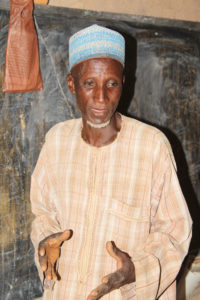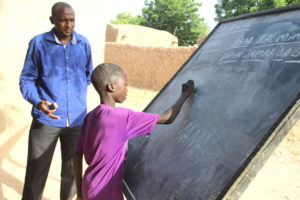In Nigeria, 36,000 out-of-school children get a chance to learn
By Boco AbdulMarch 28, 2017

SOKOTO — In Northern Nigeria’s Sokoto and Bauchi states, more than 36,000 children who were out-of-school now have the opportunity to pursue basic education through community non-formal learning centers.
As part of the Northern Education Initiative Plus project, 800 community non-formal learning centers have opened, bringing quality education to thousands of children who otherwise would not have access to schooling.
Barau Ishaq, a community leader in Sokoto, is celebrating one of the new learning facilities where children and youth will learn literacy and math. Ishaq says the non-formal learning center is a needed addition to the community, which is a long distance from a school.
“We have been forgotten for such a long time. In other places, children go to school but for us, our children have to walk several miles to go to school,” he says. “We dreamed that one day we will have something similar within the community and now our prayers have been answered.”
The Northern Education Initiative Plus project, which is funded by the U.S. Agency for International Development and implemented by Creative, seeks to improve access and quality of education for more than 2 million school-aged children and youth in formal and non-formal schools.
At the non-formal learning centers, children between ages 5 to 18 attend classes for a minimum of six hours every week, receive textbooks and are taught literacy, numeracy and life skills to prepare them to be self-reliant in the future.
These centers thrive in communities where many children are disenfranchised from formal education. They run a flexible curriculum and provide opportunities for children without basic education to learn basic skills to do better as artisans, farmers or in business.
Bringing the school to the students
“We are rallying together as a community to sustain this center even when the project ends. We want a future for our children”
Sokoto’s Attakwanyo, where Ishaq lives, is the largest community in the Gwadabawa local government area. But despite its large size, it only has one primary school.
Operating since 1922, it is arguably the oldest school in the state. Classes take place about four times a year—or whenever the teacher shows up.
In Attakwanyo, very few youth transition to secondary school after primary school and an even smaller number actually graduate.
Many parents in Northern Nigeria simply can’t afford to send their children to school, considering the costs of supplies and uniforms. Compounding the problem, many cannot pursue an education because their help is needed at home or to contribute to the household income, often by working on the farm.
With little or no access to education, many children and youth rely only on Qur’anic schools, where they memorize and recite the holy book. Unfortunately, they do not learn the math, literacy and life skills needed to function effectively in today’s world.
In light of these challenges, the non-formal learning center is a very welcome addition to the community, explains Ishaq, who is partnering with other community members and leaders to sustain the non-formal learning centers and empower even more children and youth to receive a basic education.
“We are rallying together as a community to sustain this center even when the project ends. We want a future for our children,” he says.
Reaching vulnerable students, sparking a passion for learning
In Nigeria’s northern states, it is not a rare sight to see a large group of students sitting in an open area under the trees, and listening attentively to the learning facilitator teach them to pronounce and use vowels.
A similar scene at a new learning center in Attakwanyo is playing out, with more than 60 children and youth have gathered together to learn.
Although the Northern Education Initiative Plus project’s learning centers can accommodate a maximum of 45 students, the class session has moved outdoors, under the shade of a nearby tree, to make room for even more children.
Not formally enrolled in the learning center, the 15 additional children were willing to sit on the ground to listen to lessons and soak up new knowledge.

Nine-year old Bilyaminu Ismaila is one of the 45 students enrolled at the new non-formal learning center in Sokoto. For a child who has never attended school, in just two short months he is thriving as a new learner.
“I never dreamed of going to school. I am so excited. I like my books, and I like my teachers,” says Ismaila, who can now count from 1 to 100, as well as combine consonants and vowels to form words in the Hausa language.
The project’s learning and teaching materials have been edited by Nigeria’s best Hausa and English experts to ensure that Standard Hausa is used and that the materials are embedded in the local culture and traditions.
In Bauchi’s Misau local government area, Aishat Sa’adu is experiencing a similar learning transformation. Sa’adu, who attends classes at a learning center for adolescent girls, can now recognize the letters in the alphabet and can count from 1 to 100.
Sa’adu—who dropped out of school before, got married and was divorced by the age of 16—is immensely proud of these major learning achievements.
The learning center has rekindled her desire for education, she says.
At home, she practices with other children, pairing consonants and vowels together and pronouncing the sounds loudly. She is determined to continue to study hard.
Putting the past behind her and forging ahead to a promising future, Sa’adu proudly explains, “I will complete the program at the center and hopefully further my education.”

